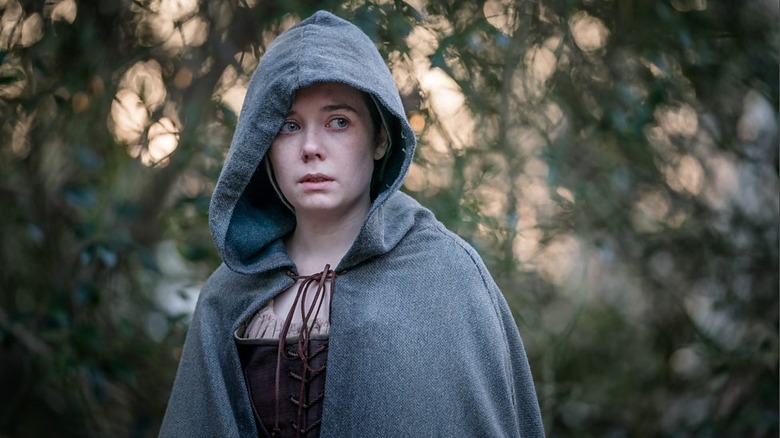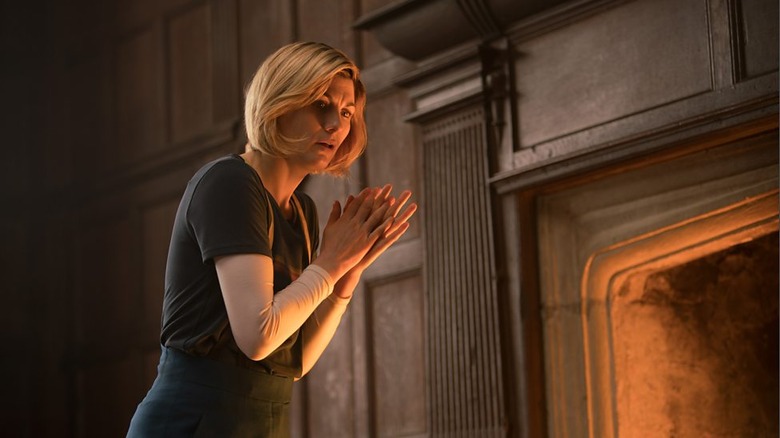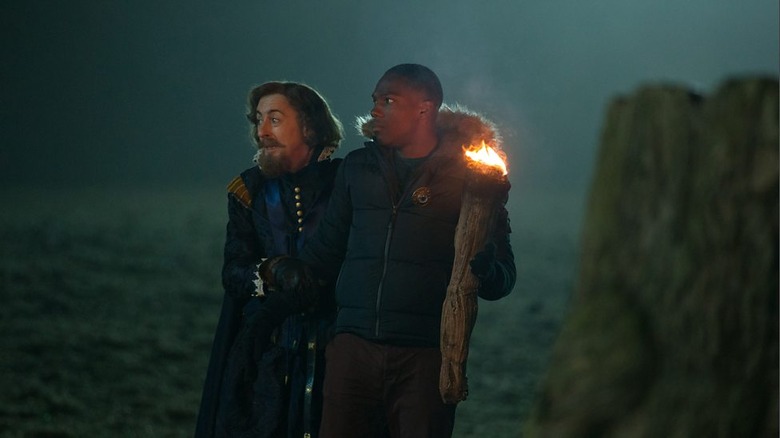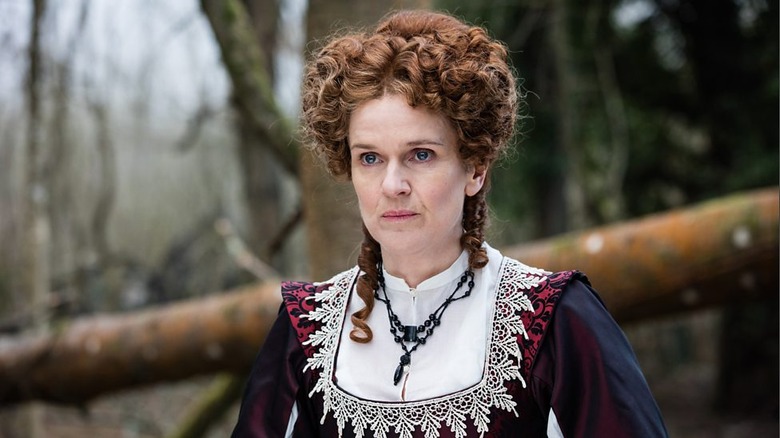'The Witchfinders' Conjures Up One Of The Best 'Doctor Who' Episodes This Season
After "Rosa" and "Demons of the Punjab," it wouldn't be a stretch to say that all of Doctor Who's historical episodes this season would be somber, pensive affairs. And that's good, and great, and powerful! But this is Doctor Who, and I still want me some camp and creepy crawlies. And thank Satan, "The Witchfinders" delivers on all of that.
The latest historical episode of Doctor Who manages to tackle this season's prevailing social issues while injecting it with a little classic Doctor Who camp, the latter of which is mostly handled by a gloriously foppish Alan Cumming. But the latest episode of Doctor Who isn't without its weighty moments, of course. The episode deals with the unjust persecution of women, blamed for blighted crops and all other kinds of maladies, leading to the deaths of thousands. And most significantly, "The Witchfinders" is the first time that the Doctor has to face the obstacles of her new gender head-on — something that has been mostly handwaved off for the past seven episodes. But in an episode that deals with witchcraft and comes on the heels of "witch hunt" being over- and misused in the current political landscape, Jodie Whittaker's acknowledgement of the trials of womanhood couldn't come at a better time.
The Witch Doctor
2018 is the year of the witch, and it's about time that Doctor Who hopped on that trend too. And the episode looks like it: Gothic overtones, a 17th century setting, dense fog-covered woods, and a fantastically creepy monster that could rival some of Doctor Who's scariest. But unlike the supernatural dealings in Chilling Adventures of Sabrina and Suspiria, things don't look so good for the witch in this week's "The Witchfinders."
Shortly after landing near a village engaging in some Sunday fall festivities, Team TARDIS find themselves in the center of a witch trial in which an elderly woman is drowned. "This is way too dark for me," Ryan remarks, apparently not having been around for the entire season. The Doctor's urging that they not interfere with the fabric of reality falls on deaf ears, including her own, as she steps up to confront Mistress Becka Savage (Siobhan Finneran), the noble lady conducting the witch trials. Whipping out her trusty psychic paper (I missed you!), the Doctor reveals herself to be the Witchfinder General, here to investigate the strange goings-on at Bilehurst Cragg. But her investigation is soon interrupted by the flamboyant entrance of King James I, played by an absolutely delightful Alan Cumming.
Doctor Who has had its share of celebrity guest actors, but Cumming is by far one of the best. It's impossible to take your eyes off him when he's on the screen, even when he's constantly calling the Doctor "lassie." Cumming's brand of camp falls more in line with black comedy, with the actor flipping between mincing and menacing with the span of seconds, gamely talking about his "pricker" before threatening the massacre of a village. There's rarely a stunt guest actor who perfectly walks the tonal tightrope of a Doctor Who like Cumming does in "The Witchfinders" and it's a thrill to behold.
The Trials of Womanhood
When Jodie Whittaker lowered her hood in that historic announcement video, we knew Doctor Who was headed for the biggest change of its 50-plus year run. The Doctor is a woman now, and with that, she'll have to deal with all the obstacles of the gender. But for the past 7 episodes, the Doctor's womanhood has rarely been a huge obstacle — yes, it's been the subject of countless thinkpieces and the Doctor's own triumphant speeches, but rarely has anyone questioned or straight up obstructed Whittaker's Doctor because of her gender.
But in "The Witchfinders," the Doctor's gender finally, truly comes into play — which is fitting considering the historic persecution of witches mostly targeted women who showed signs of independent agency. Thus when the Doctor presents herself as Witchfinder General, she's immediately brushed off as the spunky assistant by King James. And when falls into her usual habit of rattling off technobabble and whips out her sonic screwdriver — all matters that would've barely warranted more than a few perplexed stares with the past Doctors — she's accused of witchcraft and tied to the dunking log herself.
"Honestly, if I were still a bloke, I could get on with the job and not have to waste time defending myself!" she shouts in frustration, in the show's first genuine depiction of the the obstacles of the Doctor's new gender. It's no coincidence that the episode's villain is a woman (King James, though sinister, is mostly a comic supporting character), who admits to the Doctor that "these are hard times for women," even as she murders dozens. The Doctor's bitterness at the discrimination of her gender is palpable, and packs an even bigger punch in zippy episode like "The Witchfinders." By default, Ryan, Yaz, and Graham end up taking the backseat to the Doctor's conundrum, but they still get plenty to do: Ryan with his warding off of King James' flirtations, Yaz with her adventure with Willa (Tilly Steele), the daughter of the drowned elderly healer, and Graham with his uncomfortable positioning as the lone white male "authority" in Team TARDIS.
The Crucible of War
Speaking of lighter shenanigans, I am over the moon that we have some proper Doctor Who monsters again. Yes, it's all fine and dandy when the actual monsters are the humans, but give me a zombie witch any day. A mud zombie, to be more exact — the reanimated bodies of the women killed by Becka Savage filled with sentient mud possessed by a race of war criminals called the Morax. They were awakened by Becka Savage after she had chopped down a tree that was spoiling her view — a tree that acted as the prison for the Morax who had been trapped for thousands of years in Pendle Hill.
But unlike many socially-driven episodes of Doctor Who, the monsters don't detract from the greater indictment of human cruelty displayed by both Becka Savage and King James I, and even the larger angry masses in the village. The brief betrayal by the kindly Willa, who is intimidated into accusing the Doctor of witchcraft (in a very Crucible-style twist) still delivers the biggest sting. And Becka's campaign of fear against the witches after she had been possessed by the Morax feels painfully human; resorting to murder to attempt to save herself from "Satan." I could have done without the witch trial imagery of Team TARDIS turning the alien tech into torches, but the episode manages to deliver a profound message through a thoroughly enjoyable episode all the same.
Tidbits in Time and Space




